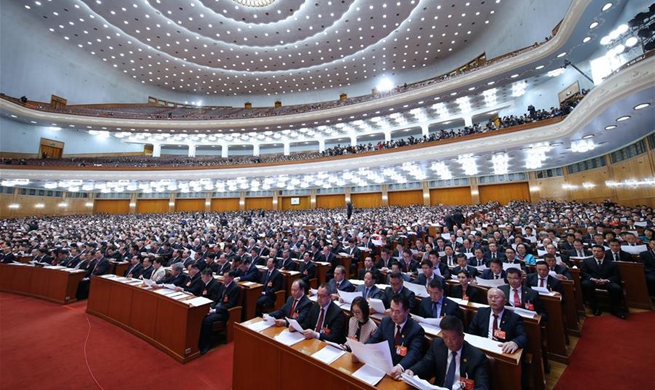LONDON, March 13 (Xinhua) -- Britain's short-term economic growth forecast has been lowered and Brexit uncertainties continued to weigh on public spending, Chancellor of the Exchequer Philip Hammond said on Wednesday.
Hammond revealed in his Spring Statement that the forecast for the country's growth in 2019 was 1.2 percent, the weakest since 2009, a sharp drop from the 1.6 percent predicted in the his budget last October. The country will expect GDP growth at 1.4 percent in 2020 and 1.6 percent in each of the following three years.
Hammond said the defeat for Prime Minister Theresa May's Brexit deal on Tuesday night had left a cloud of uncertainty over Britain, but he maintained the British economy has remained robust and has defied expectations.
He warned that Britain leaving the EU without a deal would deliver a significant short-to-medium term hit to the productive capacity of the British economy while a Brexit deal could unlock more spending.
"Leaving with no deal would mean significant disruption in the short and medium term and a smaller, less prosperous economy in the long term, than if we leave with a deal," he said. "Higher unemployment, lower wages, higher prices in the shops. That is not what the British people voted for in June 2016."
Hammond said borrowing and debt are both forecast to be lower in every year than at last year's budget. He set out further investments in infrastructure, technology, housing, skills, and clean growth, so that the UK can capitalise on the post-EU exit opportunities that lie ahead.
His announcement that public borrowing had fallen was welcomed as "good news" by the independent Institute for Fiscal Studies (IFS), a London-based economics think-tank.
IFS director Paul Johnson noted that Brexit and its unknown outcome had seen Hammond hold back on significant spending announcements based on better-than-expected tax revenue.
"The Chancellor has kept his powder dry in terms of potential extra spending in the face of this good fiscal news, waiting for outstanding Brexit uncertainty to dissipate before making his spending review decisions," Johnson said.
Later in the day, the UK parliament voted down a no-deal Brexit but May warned the legal default in EU law remains that "the UK will leave without a deal unless something else is agreed." The parliament will vote to decide whether to delay Brexit on Thursday.












